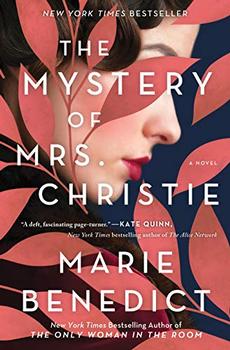Summary | Excerpt | Reading Guide | Reviews | Beyond the Book | Readalikes | Genres & Themes | Author Bio

The last chords of the orchestra sounded, and Mr. Clifford returned me to my post next to my dear friend Nan Watts, who was breathless from a quick turn around the floor with a red-faced acquaintance of her parents. As the orchestra began the next song and a florid young gentleman swooped in to fetch Nan, I glanced at the dance booklet dangling from my wrist by a red silk cord to see with whom I was paired.
A hand appeared on my wrist. I looked up into the intense blue eyes of the man who had been staring at me. Instinctively, I pulled my hand away, but somehow, he slipped my dance card off my wrist and entwined his fingers in mine.
"Forget your dance card for just one song," he said in a low, gravelly voice that I recognized as belonging to the brazen young man from a few minutes ago. I couldn't believe what he was asking, and I was shocked he'd taken my card. Allowing another man to cut into your dance card lineup simply wasn't done, even when that dance card had gone missing.
I thought I heard the distinctive chords of a famous tune by Irving Berlin. It sounded like "Alexander's Ragtime Band," but I knew I must be wrong. Lord and Lady Clifford would never have requested this modern song from their orchestra. In fact, I guessed that they'd be irate at this deviation from standard protocol; classical, symphonic—paired with sedate dances certain not to inflame the passions of the young—were the order of the day.
He watched the expression on my face as I listened to the music. "I hope you like Berlin," he said with a small, self-satisfied smile.
"You arranged this?" I asked.
A sheepish smile spread across his face, displaying his dimples. "I overheard you saying to your friend that you longed for some more up-to-date music."
"How did you manage it?" I was astonished not only at his audacity but at his determination. It was, well, flattering. No one had ever made such a grandiose gesture for me. Certainly none of the ragtag suitors with whom my mother tried to match me in Cairo for my coming out two years ago, a necessary endeavor because the cost of coming out in London—the numerous fashionable gowns, the parties attended and hosted, the price of renting a town house for the season—was too high for Mummy's reduced circumstances. And not even dear Reggie, whom I'd known my whole life as the kindly older brother of my dear friends the Lucy sisters but who only recently became much more than a family friend, had undertaken a similar effort. Reggie and I had formed an understanding—between each other and our families—that our lives and our families would one day be linked by marriage. An amorphous future marriage, but matrimony nonetheless. Although now, viewing that union in the context of this splashy wooing, it seemed a placid affair, albeit a comfortable one.
"Does it matter?" he asked.
I suddenly felt quite overwhelmed. Looking down at the floor, a fierce blush overtaking my face, I shook my head.
"I hope you'll dance with me." His voice was low and firm.
Even though I could hear Mummy's voice in my head cautioning me against dancing with a man to whom I had not been properly introduced, never mind that he had somehow wrangled an invitation to the Ugbrooke House ball and laid waste to my dance card, I said, "Yes."
Because really, how dangerous could one dance be?
Chapter Two
DAY ONE AFTER THE DISAPPEARANCE
Saturday, December 4, 1926
Hurtmore Cottage, Godalming, England
The precision of the Jameses' breakfast table setting inspires in him a sense of rightness and contentment that he has rarely felt since his return from the war. The gleaming cutlery lies adjacent to the Minton porcelain, each utensil lined up exactly with the next. The delicately etched plates, a Grasmere pattern he believes, are an impeccable two inches from the edge of the table, and the floral centerpiece—a restrained yet elegant seasonal spray of winterberries and greens—is placed at the center. By God, he thinks, this is the sort of order that can put a man at ease.
Excerpted from The Mystery of Mrs. Christie by Marie Benedict. Copyright © 2020 by Marie Benedict. Excerpted by permission of Sourcebooks. All rights reserved. No part of this excerpt may be reproduced or reprinted without permission in writing from the publisher.
Your guide toexceptional books
BookBrowse seeks out and recommends the best in contemporary fiction and nonfiction—books that not only engage and entertain but also deepen our understanding of ourselves and the world around us.